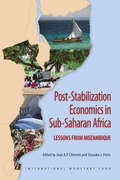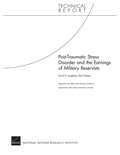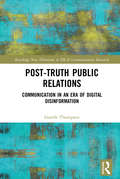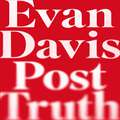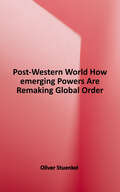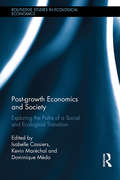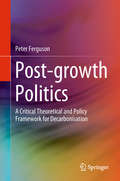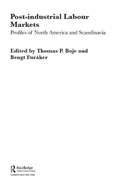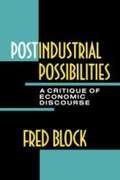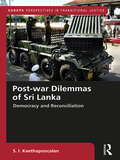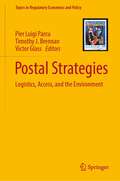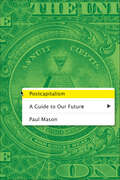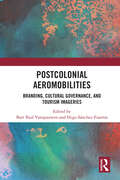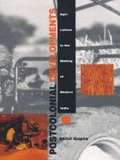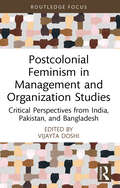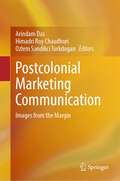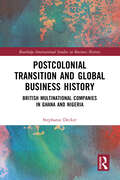- Table View
- List View
Post-Stabilization Economics in Sub-Saharan Africa
by Jean A.P. Clément Shanaka J. PeirisWritten primarily by staff in the African Department of the International Monetary Fund, this volume holds up Mozambique as a model of post-conflict economic growth and poverty reduction. It ascribes Mozamique's success to sound and sustained macroeconomic management, substantial official development assistance, two waves of reforms, and the role of the International Monetary Fund and the World Bank in promoting aid effectiveness. It draws out lessons for the rest of Sub-Saharan Africa in chapters addressing poverty reduction, sustaining economic growth, monetary and financial sector policies, macroeconomic management of scaled-up foreign aid, government-donor coordination, managing mineral resources, strengthening the business environment, and export performance and governance. Annotation ©2008 Book News, Inc. , Portland, OR (booknews. com)
Post-Sustainability: Tragedy and Transformation
by John FosterThe sustainability discourse and policy paradigm have failed to deliver. In particular, they have failed to avert the dangerously disruptive climate change which is now inevitable. So, if there is still a case for some transformed or revitalised version of sustainability, that case must now surely be made in full acknowledgment of deep-seated paradigm-failure to date. But if we really take ourselves to be living in a post-sustainable world, the issue of ‘what next?’ must be faced, and the hard questions no longer shirked. What options for political and personal action will remain open on a tragically degraded planet? How will economic and community life, political and social leadership and education be different in such a world? What will the geopolitics (of crisis, migration and conflict) look like? Where does widespread denial come from, how might it be overcome, and are there any grounds for hope that don’t rest on it?The urgent challenge now is to confront such questions honestly. This collection of essays by thinkers from a diversity of fields including politics, philosophy, sociology, education and religion, makes a start.This book was originally published as a special issue of Global Discourse.
Post-TV
by Michael StrangeloveIn the late 2000s, television no longer referred to an object to be watched; it had transformed into content to be streamed, downloaded, and shared. Tens of millions of viewers have "cut the cord," abandoned cable television, tuned into online services like Netflix, Hulu, and YouTube, and also watch pirated movies and programmes at an unprecedented rate. The idea that the Internet will devastate the television and film industry in the same way that it gutted the music industry no longer seems farfetched. The television industry, however, remains driven by outmoded market-based business models that ignore audience behaviour and preferences.In Post-TV, Michael Strangelove explores the viewing habits and values of the post-television generation, one that finds new ways to exploit technology to find its entertainment for free, rather than for a fee. Challenging the notion that the audience is constrained by regulatory and industrial regimes, Strangelove argues that cord-cutting, digital piracy, increased competition, and new modes of production and distribution are making audiences and content more difficult to control, opening up the possibility of a freer, more democratic, media environment.A follow-up to the award-winning Watching YouTube, Post-TV is a lively examination of the social and economic implications of a world where people can watch what they want, when they want, wherever they want.
Post-Traumatic Stress Disorder and the Earnings of Military Reservists
by Paul Heaton David S. LoughranAn investigation of the effects of having symptoms of post-traumatic stress disorder (PTSD) on the labor market earnings of reservists in the years following deployment.
Post-Truth Public Relations: Communication in an Era of Digital Disinformation (Routledge New Directions in PR & Communication Research)
by Gareth ThompsonThis book explores the purpose, practice and effects of public relations (PR) at a time that has been variously described as an era of populism, post-truth and fake news. It considers how PR processes have contributed to the current social condition of post-truth and what constitutes PR work in this environment. Post-Truth Public Relations: Communication in an Era of Digital Disinformation proposes that while we can now look back upon the last 80–100 years as a period of classical PR, that style is being supplemented by the emergence of a post-classical form of PR that has emerged in response to the post-truth era. This new style of PR consists of a mixed repertoire of communicative work that matches the new geometry of digital media and delivers a mix of online engagement and persuasion in order to meet the needs of increasingly partisan audiences. Using contemporary case studies and original interviews with PR practitioners in several countries, including China and the Philippines, the book investigates how PR workers have reconciled their role as communicative intermediaries with the post-truth era of digital disinformation. This thought-provoking book will be of great interest to researchers and advanced students interested in the changing nature of PR and its practice.
Post-Truth: Why We Have Reached Peak Bullshit and What We Can Do About It
by Evan Davis'A Malcolm Gladwell-style social psychology/behavioural economics primer' Evening StandardLow-level dishonesty is rife everywhere, in the form of exaggeration, selective use of facts, economy with the truth, careful drafting - from Trump and the Brexit debate to companies that tell us 'your call is important to us'. How did we get to a place where bullshit is not just rife but apparently so effective that it's become the communications strategy of our times? This brilliantly insightful book steps inside the panoply of deception employed in all walks of life and assesses how it has come to this. It sets out the surprising logic which explains why bullshit is both pervasive and persistent. Why are company annual reports often nonsense? Why should you not trust estate agents? And above all, why has political campaigning become the art of stretching the truth? Drawing on behavioural science, economics, psychology and of course his knowledge of the media, Evan ends by providing readers with a tool-kit to handle the kinds of deceptions we encounter every day, and charts a route through the muddy waters of the post-truth age.
Post-Truth: Why We Have Reached Peak Bullshit and What We Can Do About It
by Evan DavisLow-level dishonesty is rife everywhere, in the form of exaggeration, selective use of facts, economy with the truth, careful drafting - from Trump and the Brexit debate to companies that tell us 'your call is important to us'. How did we get to a place where bullshit is not just rife but apparently so effective that it's become the communications strategy of our times? This brilliantly insightful book steps inside the panoply of deception employed in all walks of life and assesses how it has come to this. It sets out the surprising logic which explains why bullshit is both pervasive and persistent. Why are company annual reports often nonsense? Why should you not trust estate agents? And above all, why has political campaigning become the art of stretching the truth? Drawing on behavioural science, economics, psychology and of course his knowledge of the media, Evan ends by providing readers with a tool-kit to handle the kinds of deceptions we encounter every day, and charts a route through the muddy waters of the post-truth age.
Post-Truth: Why We Have Reached Peak Bullshit and What We Can Do About It
by Evan Davis'A Malcolm Gladwell-style social psychology/behavioural economics primer' Evening StandardLow-level dishonesty is rife everywhere, in the form of exaggeration, selective use of facts, economy with the truth, careful drafting - from Trump and the Brexit debate to companies that tell us 'your call is important to us'. How did we get to a place where bullshit is not just rife but apparently so effective that it's become the communications strategy of our times? This brilliantly insightful book steps inside the panoply of deception employed in all walks of life and assesses how it has come to this. It sets out the surprising logic which explains why bullshit is both pervasive and persistent. Why are company annual reports often nonsense? Why should you not trust estate agents? And above all, why has political campaigning become the art of stretching the truth? Drawing on behavioural science, economics, psychology and of course his knowledge of the media, Evan ends by providing readers with a tool-kit to handle the kinds of deceptions we encounter every day, and charts a route through the muddy waters of the post-truth age.
Post-War U.S. Economic Statistics, Data Supplement
by Julio J. Rotemberg Cherie NursalimSupplements Tax Cut of 1964 (9-382-078), Nixon's Economic Strategy--1969 (8-378-258), and The Reagan Plan (9-381-173).
Post-Western World: How Emerging Powers are Remaking Global Order
by Oliver StuenkelWith the United States' superpower status rivalled by a rising China and emerging powers like India and Brazil playing a growing role in international affairs, the global balance of power is shifting. But what does this mean for the future of the international order? Will China dominate the 21st Century? Will the so-called BRICS prove to be a disruptive force in global affairs? Are we headed towards a world marked by frequent strife, or will the end of Western dominance make the world more peaceful? <p><p>In this provocative new book, Oliver Stuenkel argues that our understanding of global order and predictions about its future are limited because we seek to imagine the post-Western world from a parochial Western-centric perspective. Such a view is increasingly inadequate in a world where a billions of people regard Western rule as a temporary aberration, and the rise of Asia as a return to normalcy. In reality, China and other rising powers that elude the simplistic extremes of either confronting or joining existing order are quietly building a "parallel order" which complements today's international institutions and increases rising powers' autonomy. Combining accessibility with expert sensitivity to the complexities of the global shift of power, Stuenkel's vision of a post-Western world will be core reading for students and scholars of contemporary international affairs, as well as anyone interested in the future of global politics.
Post-conflict Security, Peace and Development: Perspectives From Africa, Latin America, Europe And New Zealand (Springerbriefs In Environment, Security, Development And Peace Ser. #13)
by Christine Atieno Colin RobinsonThis book examines links between post-conflict security, peace and development in Africa, Latin America, Europe and New Zealand. Young peace researchers from the Global South (Uganda, Ivory Coast, Kenya, Brazil, Colombia) as well as from Italy and New Zealand address in case studies traumas in Northern Uganda, demobilisation and reintegration of ex-combatants in the Ivory Coast, economic and financial management of terrorism in Kenya, organised crime in Brazil, mental health issues in Colombia, macro realism in Europe and global defence reforms within the military apparatus since 1990. The book reviews linkages between regional stability, development and peace in post-conflict societies while adding on to the post 2015 international agenda and discusses linkages between peace, security and development.
Post-growth Economics and Society: Exploring the Paths of a Social and Ecological Transition (Routledge Studies in Ecological Economics)
by Dominique Méda Isabelle Cassiers Kevin MaréchalWe stand on the threshold of a "post-growth" world – one in which the relentless pursuit of economic growth has ceased to constitute a credible societal project. The symptoms that mark the end of an era are clear and incontrovertible: a return to the regularities of the past is illusory. The pursuit of economic growth no longer constitutes a credible societal project for ecological, social, and geopolitical reasons. Edited by an impressive array of experts, this book identifies several areas in which we must fundamentally rethink our societal organisation. They ask what it means to abandon the objective of economic growth; how we can encourage the emergence of other visions to guide society; how global visions and local transition initiatives should be connected; which modes of governance should be associated with the required social and technological innovations. Alongside the necessary respect of ecological limits and equity in distribution, the promotion of autonomy (involving all in the building of socio-political norms) could serve for guidance. The topics addressed over the chapters range from the future of work to the de-commodification of economic relations; the search for new indicators of progress to decentralized modes of governance; and from the circular economy to polycentric transitions. Each contribution brings a unique perspective, a piece of a larger puzzle to be assembled. Post-growth Economics and Society is an important volume to those who study ecological economics, political economy and the environment and society. It invites theorists as much as practitioners to re-explore the roots of our societal goals and play an active role in the systemic shift to come.
Post-growth Politics: A Critical Theoretical and Policy Framework for Decarbonisation (Green Energy and Technology)
by Peter FergusonThis book uses a critical political economy approach to develop an historically and politically grounded set of strategies for states to move toward a post-growth, decarbonised global economy. It begins by examining the social and ecological costs of and limits to economic growth and determines that significant decarbonisation of the global economy can only be achieved if conventional growth-based economies are replaced by an alternative post-growth economy.Set apart from many other works in the field by its critical political economy approach to policy development, this book offers the reader three distinctive features. First, it places the analysis in historical context in order to demonstrate how the global political economy is constantly changing with respect to distributions of wealth, power and fundamental norms, and explores how states might harness and transform these contingent patterns in a post-growth direction. Second, the book is not only concerned with developing and advocating post-growth policies, but also with how these measures can be incorporated into the high-level domestic and international strategies pursued by states to ensure their political legitimacy and economic and geopolitical survival. Third, rather than proposing an idealised and politically naïve model of socioecological transformation, the proposed post-growth policy framework is highly cognisant of the geopolitical and international economic pressures facing states and demonstrates how these can be managed in the transition toward a post-growth economy.This book represents an invaluable resource for policymakers, academics, activists and students wishing to study or contribute to the transition to a post-growth, decarbonised economy.
Post-industrial Labour Markets: Profiles of North America and Scandinavia (Routledge Studies in the Modern World Economy)
by Bengt Furåker Thomas P. BojeIn nearly all OECD countries, the labour market has been in flux in recent decades. This book examines the labour markets and the institutional frameworks that condition their functioning in four different countries: Canada, the United States, Denmark and Sweden. Through a comparative study of these cases, the book discusses the nation-specific patterns that exist in a world that seems to become increasingly subject to common social and economic development.
Post-industrial Possibilities: A Critique of Economic Discourse
by Fred L. BlockWhile it is often acknowledged that we live in a "post-industrial" age, our economic concepts have lagged far behind our post-modern sensibility. In this incisive new work, the well-known sociologist, Fred Block, sheds obsolete and shopworn economic analysis by presenting a bold, sweeping reconceptualization of the economy. Post-industrial Possibilities provides a fresh understanding of the dynamics of postindustrial change while offering a road map for future economic thinking. Block takes as his point of departure the tired concepts of neo-classical economics which, while still dominant, fall short as tools for comprehending contemporary economic forces. In Block's mind, the failure to revise the concepts of industrial economics means that the reality of today's economy is increasingly understood as "through a glass darkly." Intent on reinvigorating thinking in this area, Block masterfully critiques the central categories of neo-classical economics, such as the market, labor, and capital. Block argues that the neo-classical tradition has obscured the fact that capitalist prosperity has been built not on "free markets" but rather on systematic constraints on market freedom. He further suggests that measurements of capital have become increasingly problematic and that the concept obscures the critical sources of productivity within organizations. In his far-reaching analysis of the Gross National Product, Block shows that there is a growing divergence between the factors that determine people's well-being and trends in measured GNP. Postindustrial Possibilities sets forth a new intellectual paradigm that might be called "Qualitative Growth." One of its primary foci is a shift toward improved product quality and greater priority for various non-commodity satisfactions such as leisure, interesting work, economic security and a safe and clean environment. It also promotes a recognition that greater economic efficiency rests not on infusions of capital but on cooperative labor relations and on institutional reform. Wide-ranging, intellectually vibrant and lucid, Postindustrial Possibilities will engender controversy and debate. It is an enormous contribution that social scientists and policymakers will need to come to terms with.
Post-war Dilemmas of Sri Lanka: Democracy and Reconciliation (Europa Perspectives in Transitional Justice)
by S. I. KeethaponcalanBy investigating Sri Lanka as a case study, this book examines whether democracy, compared to authoritarianism, is conducive to post-war reconciliation. The research, founded on primary as well as secondary data, concludes that political systems have little to do with the success or failure of post-war ethnic reconciliation. The Sri Lankan case indicated that post-war reconciliation is more contingent on the readiness of the former enemies to come together. Readiness stems from, for example, satisfaction in the way issues have been resolved, confidence in the other party's intentions, and the compulsion to coexist. If the level of satisfaction, confidence, and the compulsion to coexist are low, the readiness to reconcile will also be low. The end of the war had a profound impact on post-war governance and ethnic relations in Sri Lanka. Hence, the volume provides an in-depth analysis of the factors that led to the military victory of the Sri Lankan government over the Liberation Tigers of Tamil Eelam (LTTE) in 2009. The chapters delve into the nexus between governance and reconciliation under the first two post-war governments. Reconciliation did not materialize in this period. Instead, new fault-lines emerged as attacks on the Muslim community escalated drastically. This book provides a comprehensive analysis of the nature of relations between the Sinhalese and Muslims and the Tamils and Muslims, as well as the nature and causes of post-war anti-Muslim riots.
Post-war Greco-German Relations, 1953–1981: Economic Development, Business Interests and European Integration
by Christos TsakasThis book explores the post-war Greco-German relationship and asks how this relationship fits into, and changes, the narrative of European integration. The book highlights West Germany’s role in shaping Greece’s development model and argues that Greece's accession to the Community in 1981 had a long back story in the modernization strategies adopted by the two countries as early as the 1950s. The success, not the failure, of those strategies lies at the root of Greece's lingering balance of payments problems: the ever-widening trade deficit with Germany, the country’s main trading partner, was the price of Greek economic growth in the decades following the war. By addressing this three-decade story of uneasy continuity, the book offers new insights into core-periphery relations in Europe, questions the conventional wisdom about Greece’s path to Europe, and challenges the way the so-called North-South divide has been adduced to explain the recent euro crisis. In doing so, the author calls attention to past cooperation between leading political and business circles in Greece and Germany, making this a useful and insightful read for historians and political scientists alike.
Post-war Keynesianism in Germany and Western Europe (The European Heritage in Economics and the Social Sciences #28)
by Günther Chaloupek Hans A. Frambach Jürgen G. BackhausThis edited volume discusses the reception and application of Keynesian economics in Europe during the 20th century. The main focus of the book is the case of West Germany, where the strong position of Keynesian economics (primarily of the neoclassical synthesis type) at most universities since the 1950s contrasted with Ordoliberalism and the concept of the Social Market Economy, which became dominant German economic policy after the war. Chapter contributions focus on important pioneers of theoretical or political Keynesianism, such as Erich Schneider, Andreas Paulsen, and Karl Schiller in Germany, Kurt Rothschild in Austria, Gottfried Bombach in Switzerland; the influence of Keynes on other economists; and the relevance of Keynesian ideas in Austria and Norway. Providing a survey of important theoretical economists in post-war Germany, this volume will be of interest to researchers and students of economic policy, contemporary political, social and economic systems, history of economic thought and political history.
Postal Strategies: Logistics, Access, and the Environment (Topics in Regulatory Economics and Policy)
by Timothy J. Brennan Pier Luigi Parcu Victor GlassThis edited book includes original essays by prominent researchers and practitioners in the field of postal and delivery economics, originally presented at the 30th Conference on Postal and Delivery Economics held in Rimini, Italy, May 25–27, 2022. The central foci of the book are the role of digital platforms in the postal sector and the impact of vertically integrated firms in delivery markets. Other important topics include the regulation of parcels and their environmental footprint, in light of the innovations affecting the so-called last mile, and the effects of the COVID-19 pandemic on the postal sector, on both the global and local levels. Chapters also discuss traditional topics for postal and delivery sectors, including postal costs, the funding of Universal Service Obligation (USO) and the related role of Universal Service Providers. This book is a useful tool not only for graduate students and professors interested in postal and regulatory economics but also for postal administrations, consulting firms, and federal government departments.
Postcapitalism: A Guide to Our Future
by Paul MasonWe know that our world is undergoing seismic change—but how can we emerge from the crisis a fairer, more equal society?Over the past two centuries or so, capitalism has undergone profound changes—economic cycles that veer from boom to bust—from which it has always emerged transformed and strengthened. Surveying this turbulent history, Paul Mason’s Postcapitalism argues that we are on the brink of a change so big and so profound that this time capitalism itself, the immensely complex system within which entire societies function, will mutate into something wholly new. At the heart of this change is information technology, a revolution that is driven by capitalism but, with its tendency to push the value of much of what we make toward zero, has the potential to destroy an economy based on markets, wages, and private ownership. Almost unnoticed, in the niches and hollows of the market system, swaths of economic life are beginning to move to a different rhythm. Vast numbers of people are changing how they behave and live, in ways contrary to the current system of state-backed corporate capitalism. And as the terrain changes, new paths open. In this bold and prophetic book, Mason shows how, from the ashes of the crisis, we have the chance to create a more socially just and sustainable economy. Although the dangers ahead are profound, he argues that there is cause for hope. This is the first time in human history in which, equipped with an understanding of what is happening around us, we can predict and shape the future.
Postcolonial Aeromobilities: Branding, Cultural Governance, and Tourism Imageries
by Iñigo Sánchez-Fuarros Bart Paul VanspauwenThis edited collection explores how national airlines in postcolonial states operate at the complex intersection of corporate branding, cultural governance, tourism development, and national identity formation. It conceptualizes airplanes and airports as both tangible infrastructural spaces and symbolic domains that connect geographically distant regions while embodying aspirations of political sovereignty and cultural unity. Through diverse case studies spanning multiple continents, the book examines how commercial aviation's physical and cultural spaces either reinforce or challenge colonial histories and imperial legacies.The volume reveals how modern Western imperial narratives were shaped through specific cultural and social negotiations that played out in airline branding, route networks, service standards, and cultural policies. It analyzes how airlines serve as vehicles for projecting soft power and cultural diplomacy while mediating between local traditions and global modernity. Drawing on rich empirical examples from Angola, Argentina, Australia, Belgium, Brazil, Jamaica, Kenya, France, Hong Kong, Indonesia, Lebanon, Mexico, Peru, South Africa, Turkey, and the United States, this collection demonstrates how airlines employ sophisticated cultural management and corporate branding strategies to shape national and regional identities.By examining airlines as sites where business strategy, cultural policy, and identity politics intersect, this collection advances our understanding of how transportation infrastructure shapes social imaginaries and power relations in our increasingly connected yet culturally diverse world. The research has important implications for scholars of business history, cultural studies, postcolonial theory, and transportation geography while offering practical insights for policymakers and airline industry leaders.
Postcolonial Developments: Agriculture in the Making of Modern India
by Akhil GuptaThis definitive study brings together recent critiques of development and work in postcolonial studies to explore what the postcolonial condition has meant to rural people in the Third World. Focusing on local-level agricultural practices in India since the "green revolution" of the 1960s, Akhil Gupta challenges the dichotomy of "developed" and "underdeveloped," as well as the notion of a monolithic postcolonial condition. In so doing, he advances discussions of modernity in the Third World and offers a new model for future ethnographic scholarship. Based on fieldwork done in the village of Alipur in rural north India from the early 1980s through the 1990s, Postcolonial Developments examines development itself as a post-World War II sociopolitical ideological formation, critiques related policies, and explores the various uses of the concept of the "indigenous" in several discursive contexts. Gupta begins with an analysis of the connections and conflicts between the world food economy, transnational capital, and technological innovations in wheat production. He then examines narratives of village politics in Alipur to show how certain discourses influenced governmental policies on the green revolution. Drawing links between village life, national trends, and global forces, Gupta concludes with a discussion of the implications of environmentalism as exemplified by the Rio Earth Summit and an examination of how global environmental treaties may detrimentally affect the lives of subaltern peoples. With a series of subtle observations on rural politics, nationalism, gender, modernization, and difference, this innovative study capitalizes on many different disciplines: anthropology, sociology, comparative politics, cultural geography, ecology, political science, agricultural economics, and history.
Postcolonial Feminism in Management and Organization Studies: Critical Perspectives from India, Pakistan, and Bangladesh (Routledge Focus on Women Writers in Management and Organization Studies)
by Vijayta DoshiThe term feminism is often treated as a stable and universalizing politics and practice. For postcolonial feminism, the issues of interest are not only social and cultural inequalities in terms of caste, class, color, ethnicity, gender, and religion, but also historical, political, and geographical inequalities in terms of “Third World”, “Global South” and “remnants of the colonial past”. Postcolonial feminism pays nuanced attention to historical diversity and local specificity of feminist issues. This book draws upon the work grounded specifically in the context of India, Pakistan, and Bangladesh to demonstrate the plurality of thinking. In mainstream management and organization studies, context is often understood as a present, static field. This book discusses how context is an important consideration for any management and organization study and for feminist studies in management and organization studies. It informs the way we need to understand context not just as “present” but also as “past”. Postcolonial feminism highlights the historical roots and past privileges of a context that often gets overlooked in management and organization studies, where context is mostly understood in the present.This book highlights the contributions of women writers, poets, and activists such as Christina Stringer, Elena Samonova, Gayatri Spivak, Mary Douglas, Naila Kabeer, and Uzma Falak to postcolonial feminism in management and organization studies. Each of these women has engaged with writing that has the potential to enrich and transform understanding of postcolonial feminism in management and organization studies, making this book a valuable resource for researchers, academics, and advanced students.
Postcolonial Marketing Communication: Images from the Margin
by Arindam Das Himadri Roy Chaudhuri Ozlem Sandikci TurkdoganThis volume approaches marcomm (marketing communication) from the phenomenology of markets in the context of the Global South and its postcolonial experiences. It provides a fresh perspective to the current paradigm and offers a fresh discourse on the current theories of marketing communication. The book demonstrates how marketing communication, an essentially Global North discourse reinforcing hegemony, can be critiqued and deconstructed when subjected to postcolonial critical analysis. Recognizing as commonplace, the Global South has either willingly embraced or been ideologically coerced into adopting a Western marketing communication system. This system is evident in its theories and practices, mirroring Western themes, symbols, stories, and knowledge frameworks, consequently fostering subjectivities that lack critical self-reflection and are dependent on Western influences. But what remains more interesting is how such an ideological system, mediated through a quintessential Global South modernity, generates a new habitation of modernity at the margin. Essentially a reaction from the Global South perspective, the book thoroughly examines the realities around marketing communication discourses. The book even engenders alternatives to hegemonic marketing communication discourses and a set of “other” epistemologies of alternate modernities of equity and justice. From African to Turkish, from Indian to Canadian first nations, Australian Aborigines to Polynesian-American, postcolonial subjectivities through marcomm across the globe get a voice in the volume. The collection in this volume is a decolonizing attempt that thwarts cultural globalization, examines colonial discourses, cuts across essentialized identities, mobilizes resistance, interrogates power structures and mechanisms of knowledge production, dissemination, and legitimization, and celebrates the new-formed cultural identity of the Third/Fourth World. The book is essential read for researchers, students and practitioners of Marketing who wish to gain a deeper understanding of an oft ignored aspect of marcomm.
Postcolonial Transition and Global Business History: British Multinational Companies in Ghana and Nigeria (Routledge International Studies in Business History)
by Stephanie DeckerBritish multinationals faced unprecedented challenges to their organizational legitimacy in the middle of the twentieth century as the European colonial empires were dismantled and institutional transformations changed colonial relationships in Africa and other parts of the world. This book investigates the political networking and internal organizational changes in five British multinationals (United Africa Company, John Holt & Co., Ashanti Goldfields Corporation, Bank of West Africa and Barclays Bank DCO). These firms were forced to adapt their strategies and operations to changing institutional environments in two English-speaking West African countries, Ghana (formerly the Gold Coast) and Nigeria, from the late 1940s to the late 1970s. Decolonization meant that formerly imperial businesses needed to develop new political networks and change their internal organization and staffing to promote more Africans to managerial roles. This postcolonial transition culminated in indigenization programmes (and targeted nationalizations) which forced foreign companies to sell equity and assets to domestic investors in the 1970s. Postcolonial Transition and Global Business History is the first in-depth historical study on how British firms sought to adapt over several decades to rapid political and economic transformation in West Africa. Exploring both postcolonial transitions and development discourse, this book addresses the topics with regard to business and economic history and will be of interest to researchers, academics, and students in the fields of organizational change, political economy, African studies and globalization.
